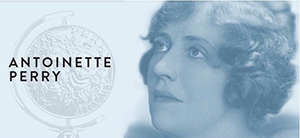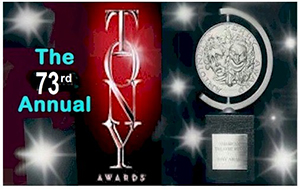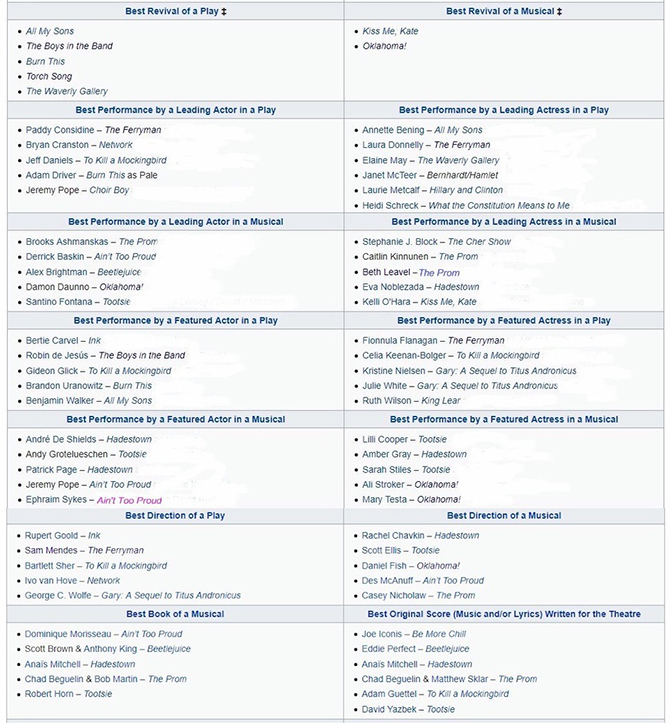73rd Annual Tony Awards Are Telecast on June 9
Nomination Highlights and the Answer to Who’s This “Tony”

by Ellis Nassour
The American Theatre Wing’s 73rd Annual Tony Awards, honoring excellence on Broadway and regional theater, will be presented by the Broadway League and Wing on Sunday, June 9, telecast live from Radio City Music Hall from 8 – 11 P.M. on CBS. Returning to host is Tony-winning comedian/actor/and late-night TV host, James Corden. This marks Corden’s second time hosting the Awards. He proved quite a smash in 2016. His own Tony for Best Performance by a Leading Actor in a Play came in 2012 for the British comedy One Man, Two Guvnors.
Highlights of the season’s Tony nominations follow BELOW.
Like Ben Vereen, have you ever wondered how the Tony Awards got their name. When Vereen was co-starring in Jesus Christ Superstar, he received a letter by messenger. It was from the American Theatre Wing. He asked the stage doorman what that was and the gent had no idea. He opened the letter. “It read: ‘Congratulations, Ben Vereer. You have been nominated as Best Featured Actor in a Musical for your performance.’ It was signed, The Tony Awards.’ I asked, ‘Who’s this Tony?’”

Tony, originally Toni, was Antoinette Perry, an amazing overachiever, an actress of some renown, and an early female producer and director. In the 1940s, at the start of WWII, she also was one of the Broadway luminaries who created an ongoing treat to GIs, and later, on their return home, the opportunity for an education. It’s an interesting story, deep into the mystique of New York theater – and one that would be lost if the awards weren’t named in tribute to this aptly-named leading lady.
Born in Denver in 1888, Antoinette Perry, a petite blonde nicknamed Toni, grew up aspiring to replicate the thespian artistry of her aunt and uncle, respected touring actors. At 15, she joined their company. “I watched and learned,” she wrote friends, “doing everything from wardrobe to selling tickets. It didn’t take long for me to graduate to playing the ingénue.” Eventually, sensing promise, her uncle trained her in Shakespearean male roles.
In 1905 she auditioned for the part that brought her to New York. The play was The Music Master, a long-running melodrama about a Viennese conductor in America searching for his daughter. Miss Perry’s
“father” was David Warfield, one of theater’s most popular actors.
During the run, he suggested his friend, impresario David Belasco audition her for the female lead in his play A Grand Army Man. She got the role and helped open his Stuyvesant Theatre (now the Belasco).
The recipient of rave reviews, bachelors of the day took notice. But it was a hometown beau, Frank Frueauff, vice president of Cities Service (now CITGO). They became engaged in 1909 and soon married. There was a stipulation that she would give up the stage.

For 10 years, the couple traveled the world and led a life of abundant luxury. However, Miss Perry couldn’t get theater out of her blood. She discretely approached Brock Pemberton, a flamboyant press agent turned producer, and became an investor in his production of Zona Gale’s comedy Miss Lulu Bett., which not only became a hit but went on to win the Pulitzer Prize. When her husband discovered his wife was a theater “angel,” he caved and gave his blessings. In 1922, he suddenly died after a major heart attack. He left a $13-million estate. Miss Perry went into a deep depression.
“Mother thought of returning to the stage,” said her late daughter Margaret Perry, a one-time actress and director, “but she relished the the extravagant life the inheritance gave. Soon, she was actors best friend, lending money with no expectation of repayment and bailing actors and playwrights out of overdue hotel bills. The summer of 1923, we set we set off on a seven-week European tour. It was my sister Elaine and I, our governess, Uncle Brock, as we were instructed to call him, his wife Margaret, and 10 others. On coming home, Brock kept tempting mother. It didn’t take long for her to hear theater’s siren call again.”
A Director is Born
Inspired by actress/playwright Rachel Crothers, who directed her own plays, Miss Perry decided to direct. There were few women directors, but her money, which she doubled playing the stock market, and the relationship with Pemberton gave her entree. “They joined forces, professionally as well as romantically,” Margaret revealed, “and had modest successes. Then, they struck pay dirt!” It was with Preston Sturges’s 1929 Strictly Dishonorable, a cynical play about virtue and Prohibition. Scalpers were getting $30 a ticket. A critic praised Perry “for doing a man’s job.” Movie rights were sold. “They were on their way to easy street,” said Margaret. “A month later, the stock market crashed.”
Miss Perry awoke $2-million in debt. “It took seven years to recover,” Margaret stated. “Somehow, probably because of the success of the play, she secured a bank loan and it was soon business as usual.”
Perry and Pemberton shared an intimate office in a theatre (it was adjacent to the Imperial Theatre), and lunched daily at Sardi’s, where they fueled lots of theatrical gossip. However, at the end of their business day, she’d go home to her children and he to his wife.
Her biggest success as director came in 1944 when she staged Harvey, the runaway-hit comedy by Mary Chase about an affable man with an unseen friend he describes as a six-foot, three-and-one-half-inch tall rabbit (the movie version starred James Stewart).
A Generous Leader
In spite of her theatrical credentials, Miss Perry is best remembered for her generosity and leadership in World War II as a co-founder of the Theatre Wing of Allied Relief, subsequently, the American Theatre Wing. She was instrumental in founding the Stage Door Canteen in the basement of the (now razed) 44th Street Theatre, where stars worked as dishwashers, waiters, waitresses, and entertained the armed forces. The sale of film rights for a story about the canteen, and a six-figure check from Miss Perry along with support from Richard Rodgers and Oscar Hammerstein, provided USO tours to overseas troops.
Margaret confided that her mother was an inveterate gambler. “The seed money for many a Wing activity or investment came from her track winnings. Even during board meetings, mother played the horses. She’d have her secretary tip toe in and give her the odds, then she’d place a wager with a bookie.”
Miss Perry was also president of the National Experimental Theatre and financed, with Actors’ Equity and the Dramatists Guild, the work of new playwrights. During and after the war, she underwrote auditions for 7,000 hopefuls. Her dream of a national actor’s school was realized in 1946.

A Love for the Theater
By the mid-1940s, Ms. Perry was $300,000 in debt and living on $800 a week from her Harvey royalties. Once a reporter questioned her support of things theatrical. He asked, “Why do you devote so much of your money and time to such thankless activities?” Replied Miss Perry, “Thankless? They’re anything but that. I’m just a fool for theater.”
“True,” said Margaret. “It was what she lived and breathed. Her outstanding trait was that she cared. It didn’t matter if you were a janitor, cab driver, or, on that pedestal of pedestals, an actor.”
In the mid-40s, a Minnesota company introduced their Toni brand of home permanents. Miss Perry quickly became Tony to friends and loved ones.
“Mother developed heart problems,” Margaret explained, “but, as a devout Christian Scientist, she refused to see a doctor. That, her directorial duties and her dedication to Wing took a terrible toll. She gave up café society and stayed home with us. But every night, from wherever he was, Uncle Brock would call Mother. Often his calls were the only thing that alleviated her intense physical pain.”
On June 28, 1946, as Margaret and Elaine (an actress, stage manager, and producer/director who died in 1986) made plans for their mother’s 58th birthday the next day, Miss Perry suffered a fatal heart attack.
Pemberton memorialized her as “an individualist who met life head on, dramatized life, and gave of a generous nature.” He proposed an award in her honor for distinguished stage acting and technical achievement. At the initial event in 1947, as he handed out an award, he called it a Tony. The name stuck.

For a complete list of the 2019 Tony Awards, special features, contests, and more information, visit www.TonyAwards.com.





